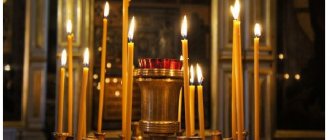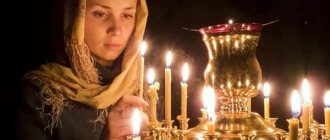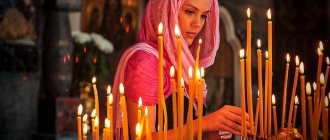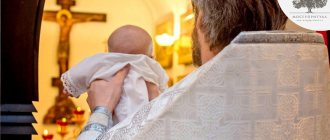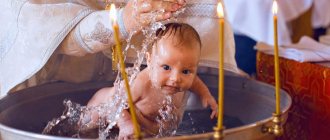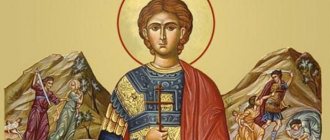Why do they pray to the martyr Uar for the unbaptized dead?
With God, everyone is alive—every Christian knows this.
This means that we need to pray not only for the living, but also for the dead. But why then don’t the Church commemorate the unbaptized? Who is the martyr Uar and why do they pray to him for non-believers? As life experience shows, for many, the path to the temple begins after encountering illness, sorrow, and even the loss of relatives. When a loved one is no longer around, the question arises: “What can I do for him?” How to survive the pain of loss?
Answers and comfort can truly be found in church. After all, every Christian believes that life does not end with earthly boundaries. After physical death, a person’s soul does not cease to exist. And after the second coming of Christ, it will be determined exactly what each person deserves. The Kingdom of Heaven awaits some, while pitch darkness awaits others.
But no one knows when Christ will come to earth in glory to judge everyone. Until this time, you can still influence the final decision. How? Prayers for the departed.
But what these prayers will look like depends on what kind of life the deceased spent on earth.
Sacrifice to God: why do they put candles in the temple?
The custom of making a sacrifice to God dates back to ancient times, when people, fearing the wrath of higher beings and wanting to somehow appease them, tried to share their spoils with them. But how to treat a creature that does not have a materially expressed body? Probably only by turning the treat into smoke. This is what people did, burning vegetables and fruits, animals and even other people on sacrificial altars.
With the advent of the New Testament, the concept of sacrifice changed.
Christians, who began to be guided by new values and principles, began to offer God a symbolic small sacrifice - a wax candle. The main task of such a sacrifice is not to satisfy the hunger or thirst of the Lord. By buying a candle in the temple, we donate a small amount to make the house of the Lord more beautiful and better. But you don’t have to try to buy as many candles as possible to please God. One cheap candle will be enough for him. Some churches generally place special trays with free candles for people who do not have the opportunity to buy them.
Lighting a candle in front of the icon only symbolizes the Christian’s desire to join the church and the prayers of the parishioners. You need to support your request to the Lord for the repose of the soul of a loved one by reading a prayer.
The ritual of placing a candle for repose has its own rules, which follow from the general rules of conduct for a person praying in church. Therefore, any parishioner should remember the following points:
- Before entering the temple, you must cross yourself three times and make three bows from the waist.
- Upon entering the church, you must linger in the vestibule, kiss the cross located there, and, if desired, venerate the icons.
- Before you start lighting candles, you must venerate the icon on the central lectern. After this, you can turn to other icons in the temple.
- In church it is not customary to talk loudly or walk from place to place. If you need to ask people nearby about something, you can do it in a whisper.
- As a rule, men occupy the right wing of the temple, and women stand closer to the left side for prayer.
- It is forbidden to light candles for health or for repose during the reading of the Gospel, the singing of the Eucharistic Canon and the “Cherubim”: these moments of the service are especially important for every Christian; it is forbidden to miss them, being distracted by some other business, even by addressing the saints.
- Before placing a candle in a candlestick, you need to cross yourself.
Candles for health can be placed in front of any icon in the temple. But funeral candles, as the site sympaty.net found out, are usually placed in a strictly designated place.
Prayer for the Orthodox dead
If the deceased believed in God, was not formally baptized, and began the Sacraments, then such a person can safely be called a member of the Church and commemorated not only in home prayer, but also in church.
You can light candles and submit notes for the proskomedia - a special part of the Liturgy, during which for each person commemorated, a particle is taken out from the prosphora, which will be immersed in the Communion cup under the words of prayer:
Wash away, Lord, the sins here remembered by Thy Honest Blood and the prayers of Thy Saints.
It is also customary to perform special memorial services for the deceased Orthodox Christians - memorial services. At such services, they usually write lists of names for commemoration and bring all kinds of products - each according to their capabilities.
That is, in addition to prayer, you also perform alms, which is considered one of the types of “help” for the dead.
And of course, no one talks about prayer for the dead:
- Reading the Psalter of Repose.
- Akathist for the one who died (40 days after death and the same number before the anniversary).
- All kinds of prayers - for every deceased person, widows and widowers, children for parents and vice versa, etc.
In the Orthodox prayer book you will see many different prayer texts. It is better to consult a priest about what is more suitable in your case. The main thing is not volume and quantity, but sincerity and burning of the heart. God will hear a few words faster, but from the bottom of my heart, with deep hope for God’s response, than long prayers that we have not experienced either in our hearts or in our minds.
Prayer for the unbaptized and people of other faiths is not offered by the Church
If everything is more or less clear with the commemoration of the deceased Orthodox, then the answer to the question “How to pray for the unbaptized and people of other faiths?” doesn't look as transparent.
Orthodox priests do not perform funeral services for such people, even if their relatives insist. It is just as impossible to submit notes for those who died unbaptized as for those of other faiths. Why? Because these people during their lifetime did not want to become Orthodox - members of the Orthodox Church. They were not baptized and, accordingly, did not participate in the Sacraments.
But God never acts by force, does not force anyone to do anything. So can the Church perform a funeral service according to Orthodox customs for someone who did not belong to Her during his lifetime? After all, it will be violence! Therefore, in Orthodoxy, it is not customary for the unbaptized to have a funeral service in our churches; notes are not given for them for church commemoration and, accordingly, a conciliar prayer for the unbaptized is not heard.
Therefore, no matter how painful it may sound for relatives, friends and relatives, they will also not be able to remember in notes the names of dear people who were baptized in Catholicism or Protestantism, not to mention Muslims, Buddhists and representatives of other movements who are not at all believe in the Christian God.
If the dead did not believe in God, then the Church cannot forcibly ask the Lord to accept these people to Himself, to settle them in heavenly abodes together with the righteous.
LiveInternetLiveInternet
A special day is approaching - April 21 - Radonitsa or Radunitsa. Our Slavic ancestors called this day Rodonitsa. There are other similar names for this day. Radonitsa is a day of special remembrance of the dead, a special memorial day. This day has been celebrated in many nations since ancient times, and Radonitsa is also recognized by Christianity. Radonitsa is the only day in the whole year when, according to Orthodox traditions, it is possible to light a candle in a church for someone who died unbaptized, a suicide, and other deceased relatives or loved ones, whose commemoration by the church on other days is not permitted. Such people are not recognized by the Orthodox Church as “theirs”, and finding help from priests if relatives want to help such a deceased person in some way often turns out to be almost impossible. We are talking not only about suicides, but also about people, for example, who drowned under unclear circumstances. About people missing and under unknown circumstances, about people whose body has not been found. About people who were not buried according to Christian customs. About the restless dead. We are also talking about people who were previously customary to be buried outside the cemetery - murderers, maniacs, rapists and others who were mired in sins and did not repent before death (“evil souls”). Sometimes priests (according to the apostolic rules) do not allow those who were reposed in their time and by their death, those who were baptized, who called themselves Christians during life, but who did not often go to church, to attend the funeral service. For example, if you didn’t go to church for six months before your death, you don’t have a funeral service. It is believed that this person also died in unbelief, a non-Christian, and therefore he is not “ours”, does not belong to our egregor. These are the rules of Orthodoxy, and it is not for you and me to judge them. The question is, what should family and friends do when they ask:
- “How to help a suicide?”
- “Is it possible to remember suicides?”
- “How to remember drowned people?”
- “He died unbaptized, but I am Orthodox - how to remember” and others.
Perhaps you will find the answer in this article, and you will be able to spend Radonitsa productively this year.
Radonitsa to help a suicide.
Are suicides remembered? How and when to remember suicides? The priests of the Orthodox Church advise praying for such people on your own at home, but they consider this to be absolutely hopeless and, moreover, dangerous for the person himself who wants to help such a deceased person. Moreover, we are not talking about Radonitsa, but in general. “Of course, you can try to dare this home prayer feat. However, be sure to take a blessing from the priest, and if he refuses, do not be outrageous - this will not end well,” is the approximate answer. Orthodoxy has examples of suicides being forgiven for this terrible sin - there are several examples of a saint begging a suicide during his lifetime. Of course, the saint has a large reserve of God's mercy, which he himself has earned and which he can give in payment along with his fervent prayer for such a person at his own request. For example, Seraphim of Sarov, after begging a suicidal young man, fell ill for several months, but he knew what he was doing and he himself wanted to help the suicide.
Here’s an example I found in a cartoon, when the saved nuns prayed to their unbaptized infidel savior. The cartoon is humorous, but the point is that the nuns also have their own supply of God’s mercies, which they gave to him for his salvation. Whether he was happy about this fact - look and don’t take it seriously.
https://www.youtube.com/watch?feature=player_embedded&v=nX2GvFj7VBw
If we continue this topic seriously, then it is up to everyone to personally decide what to do with such a deceased person whom the church has abandoned. It is often advised to simply forget about them. Previously, such dead people were buried outside the village cemetery, in especially remote places. If the cemetery was located closer, then such people were buried, on the contrary, further away.
Moreover, they tried to avoid such places, and without special need not to go to that remote cemetery. Nowadays, suicides can be freely buried along with everyone else, which is not entirely correct. Why does this matter? Where the souls of suicides end up after death, to put it mildly, they are not entirely happy. The energy shell of the suicide, which remains with the body near the grave, also suffers greatly. Most of the emotions after death are distorted, simplified or die off altogether, and very often both the energy shell of the suicide and his soul “get angry”, are reborn into fallen creatures, become bestial or demon-like and can attack the living. The soul of a suicide, having realized its posthumous fate, really does not want to leave the earth, and, if possible, tries by hook or by crook to “catch on” to the earth. For example, she can inhabit a person passing by her grave, thus causing obsession, demonic possession. The energy shell is located near the grave of the suicide, and his soul can visit the grave, the place of life and death, only on this one day of the year - on Radonitsa. If this soul is not allowed to leave the places of its posthumous stay at all (for special offenses), then it can only hear the words, questions, prayers addressed to it on Radonitsa and be able to answer the questioner. Only one day a year, on Radonitsa! This is explained by the special energy of this day and the fact that the line between the “lower” parts of Navi and Yavi on Radonitsa is especially thin.
So, the decision is yours whether to help such a deceased person. But if you still decide to help a suicide or a drowned person, or an unbaptized person, then do not miss Radonitsa. Go to church on Radonitsa, pray for this soul, light a candle for the repose of this soul. You can take the prosphora and try to give communion to such a soul, leaving it on the grave.
The only note that I consider important for your understanding is this. The so-called evil souls do not remember at home, especially on Radonitsa! For example, if the deceased committed suicide at home (in your house or apartment where you live), then you should not leave food for him (bread, honey, etc.) in the same house. You should not “feed” him in the house; this is a special place for such a soul - the place of his death. Don’t make a mistake. The soul or energy shell will get stronger from the food offered to it, gain strength and can begin to torment the living, attack, “take out its anger” on those living in this house. In this case, you will have to expel her.
If your deceased relative or friend drowned under unclear circumstances, or his body was not found and was not buried, and you want to help the soul of the drowned person, then also do not miss Radonitsa. If there is a grave, then go to Radonitsun’s grave. If the body was not found, then on Radonitsa you need to go to the body of water in which your drowned person drowned - a lake, river, sea. Or to that body of water that has a connection with that; for example, if you drowned in the Black Sea, but this sea is far from you, but you have the opportunity to go to the banks of the Dnieper, Dniester or another river flowing into it, then it will be easier and more convenient for you to go there to remember the drowned man. By the way, they also commemorate on Radonitsui other people who died without a body found and buried according to customs - if they disappeared in the mountains, then they go to the foot of the mountain, if in the forest, then to the forest, if in a swamp, then to the swamp, and so on. So, to remember the drowned man, they came to the reservoir in Radonitsyvo. It is possible to transfer food to the dead in two ways - with or without a boat; it depends on tradition and does not detract from the result itself.
1. If you don’t have a boat, then first throw the petals of fresh flowers over the waves, then throw the shells of boiled eggs into the water, then put bread and honey into the water. At the same time, they think about the person and ask for news from him.
2.If you have a boat, then put petals of fresh flowers in it, put a lighted candle, crumble the shells of boiled eggs, and also put bread with honey. If the drowned man smoked during his lifetime, then you can put a lit cigarette in the boat. Also, sometimes they put a note in this boat with the name of the drowned man, and in modern times, his photograph - it’s at your discretion.
Why exactly this “set”? It is believed that flower petals are placed so that the drowned person can hear you. The shells of boiled eggs are needed so that he can receive news from you and answer you (it’s like a “letter to the water king”). Bread and honey is what the dead crave to satisfy their hunger. According to the old custom, they did not go to the dead without bread and honey.
You can also pray for Radonitsa in the temple for such a dead person, or at home. You can also leave water, bread and honey for him at home, and light a candle. The best option is to light it in the evening on Radonitsukoster, as was said, and feed it that way. By the way, if on Navy Day it is preferable to throw ash branches into the fire to keep the dead warm, then yew branches are thrown on Radonitsa. If you don't find any, use existing ones. After the fire, go to bed. Perhaps the drowned man will come to you with news in a dream. Usually they “respond” to the ritual not on the same night, but it is believed that they will receive your message before the Mermaid Day and then they will be able to respond, give you news about how they are there and how you can help them, how to ease their posthumous fate . In addition, in the evening before going to bed, place a lighted candle on the Radonitsa window - it will show the dead the way to your home, and will also ward off evil spirits that may come, taking the form of the dead.
I will also note separately about restless souls, which are often those who died before their time, those who died, those killed, those who fell in battle, and others. With this ritual on Radonitsa, you can ask this soul itself what it needs for its repose. It often turns out that such a soul has some unfinished business, because of which it cannot find peace, and perhaps you are the only one who can help it. This may not be difficult for you, but it is very important for this soul. Do what keeps her going, finish this task for her, and it will become much easier for her. You can find out what is holding her in the described way only on Radonitsa.
So, now you know when you can remember suicides, unbaptized people, drowned people and others. You know that this is what Radonitsa or Radunitsa is for. You know how to help a suicide, how to remember a suicide, how to remember a drowned person. I will also add that you cannot write about all those who died not “as they should” in one article, and you cannot say unequivocally everything about what and with whom after death. Each case is unique and often requires an individual approach and consideration. But such a commemoration can be done on Radonitsa for any deceased person, without exception.
source https://magomagii.ru/
https://poleznosti.mirtesen.ru/blog/43347417948/Rad...yts,-utoplennikov,-nekrescheny
They pray to Saint War for the unbaptized: truth or myth?
Recently, the prayer to the martyr Uar for the unbaptized and even suicides has also gained particular popularity.
Its adherents believe that supposedly Saint Uar, to whom the pious Christian Cleopatra zealously prayed for her dead pagan relatives, begged the Lord for the salvation of the departed. But where is the truth and where is fiction? Let's try to figure it out.
Martyr Uar is by no means a fictional character. He was a warrior from the time of Emperor Maximin - one of the famous persecutors of Christianity - and a secret Christian. Therefore, at night he visited the imprisoned Christians. One day he visited seven teachers and turned to them with a request to pray for him, since he was not yet so firm in faith as to confess Christ before his martyrdom.
Shortly after this, one of the teachers fell ill and died. Then the martyr Uar decided to “replace” him and suffer with the rest. The saint died from severe torture, but never renounced God.
One pious widow, seeing his faith and suffering, decided to hide the relics of the martyr in her home. She and her son repeatedly prayed to the saint.
When the persecution of Christians stopped, she decided to return from Egypt to Palestine. In order to take the relics of the saint with her, she said that these were the remains of her husband, who was a military leader. So she managed to transport the holy relics and place them in the same place where the tomb of her ancestors was.
Together with her son, Cleopatra prayed every day at the tomb. Other Christians followed her. Through the prayers of the martyr Uar, they received healing and relief from illnesses.
It is necessary to build a temple for the saint - the widow conceived and began to implement her plan. Her son John helped her in everything. Together with the bishops and a meeting of Christians, they transferred the remains of the righteous man to a new tomb, near which Cleopatra fervently prayed for herself and her son. She dreamed of the boy becoming a warrior. But she asked the martyr Uar to help her son choose a path in life.
After this, John, who was already 17, died suddenly of a fever.
The woman was in complete despair and even began to grumble against the martyr - how could he allow this to happen? But the saint appeared to her and said that John really had the better path. If on earth he had to become a warrior and serve the earthly king, then in the Kingdom of God he serves the Heavenly King. The happy son asked his mother not to suffer, because he, together with the Angels, served the Lord.
After this, Cleopatra buried her son next to the saint, distributed her property and prayed all her time in the built temple, near the relics of the martyr Huar.
As we see, in the life of the saint there is not a single word that the widow prayed for her pagan relatives. She prayed only for her son. But he was by no means a pagan. If John, together with his mother, built a temple for the saint and prayed at the relics, then could he be an unbeliever?
Unfortunately, the beautiful story that Saint Uar begged Cleopatra’s relatives, who were pagans and during their lifetime chose the path of renunciation of God, remains just a story that inspires prayer for the unbaptized.
Is it possible to “beg” an unbaptized person?
If Saint Uar did not beg the pagans, then how should we approach prayer for the unbaptized and people of other faiths? Is there any point at all in praying for those who did not strive for God during their lifetime?
Let's pay attention to two nuances:
- God gave every person free will. And if someone does not believe in God and does not want to be with Him after death, then the Lord does not act by force. He respects a person's choice, no matter what negative consequences it may have.
- Even in the prayer itself to the martyr Uar it is said that it weakens the eternal torment of the unbaptized, but does not “guarantee” him paradise.
After all, what is the Kingdom of Heaven? This is not some foreign resort, not a paradise where palm trees grow and birds sing, no one does anything, everyone enjoys the beauty of nature, the taste of fruits and enjoy life. The Kingdom of Heaven is union with God, being with Him and the righteous who themselves wanted to be with God.
For the soul of one who during his lifetime did not want to be with God, his stay in the Kingdom of Heaven will not be at all as sweet as for the righteous. And is it possible to “send to heaven” someone who during his lifetime did not make any efforts, but if his relatives pray so fervently for him?
The question is controversial. But a person is not able to answer it. God decides that. Not some formidable judge, but the Merciful Lord. How He will treat the deceased, unbaptized person, for whom loved ones are praying, no one can say for sure.
One should rely only on His mercy and sincerely pray for the unbaptized. Not only to the martyr Huar, but also to other saints, the Most Holy Theotokos, the Merciful and Loving God. In your own words, texts from the prayer book, or as suggested by Lev Optinsky.
But before that, it’s better to consult with a priest, tell us about the life of the person for whom you want to pray. An experienced clergyman will give advice and warn about difficulties and temptations.
Archpriest Dimitry Smirnov speaks about prayer for the unbaptized deceased:
Complete collection and description: prayer for the unbaptized deceased for the spiritual life of a believer.
How to pray for the unbaptized living and dead?
The Orthodox Church calls all Christian believers to constant prayer. Of course, most often we pray for people close to us, relatives, friends. But there are situations when a person in need of prayer help has not been baptized in the Orthodox Church. What then should be the prayer for the unbaptized living and deceased?
The importance of the Sacrament of Baptism for a person
Baptism is one of the seven Sacraments of the church, and without exaggeration it can be called fundamental. The spiritual life of an Orthodox Christian is impossible unless he sooner or later receives church baptism. Why is it so important for a person and what does it give?
First of all, baptism makes a person a full member of the Church of Christ. By accepting the Sacrament, a person confesses faith in the crucified Jesus Christ and shows his intention to follow Him in life. In addition, in this Sacrament, the seal of original sin, which is inherent in each of us, is washed away from a person.
The rite of baptism with water itself dates back to Gospel times. Thus, the Forerunner of the Lord John baptized the people in the Jordan River. It was there that Our Lord Jesus Christ Himself received the Sacrament during His earthly life.
Thus, we can say that by accepting this Sacrament, a person becomes open to God’s grace and can boldly follow Christ in the fullness of church life.
Features of prayer for unbaptized living people
If a person for some reason does not accept the Sacrament of Baptism, he cannot be a full member of the church. This is expressed, first of all, in the opportunity to participate in the Divine Liturgy.
Interesting! Some time ago, unbaptized people could not enter the temple beyond the vestibule, and also had to leave the Divine service in a certain part of it.
Today, such a strict restriction has been lifted, but still an unbaptized person cannot participate in worship as an equal.
The main feature of prayer for unbaptized people is that they cannot be remembered at the Divine Liturgy.
The priest at the altar offers a bloodless sacrifice, symbolically representing the sacrifice of Jesus Christ. At this time, pieces are taken from the prosphoras for each name submitted for commemoration. These particles are then sent to the Chalice and become a great shrine - the Body of Christ.
If a person deliberately avoids baptism, then Christ’s sacrifice for him becomes meaningless. That is why, in order to participate in the Sacrament of Communion, and indeed in the fullness of the Liturgy, it is necessary to be baptized in church.
But what should we do if a person close to us, whose fate we care about, turns out to be unbaptized? He cannot be commemorated in church, but there are no obstacles to purely personal prayer. At home, in front of the home iconostasis, we can pray for all the people close to us, even if they have not been baptized.
Prayer for unbaptized babies
Prayer for children who have just recently been born and have not yet had time to be baptized also has its own characteristics. There is a tradition of baptizing children after the 40th day of birth, but in fact, the baby can be baptized as soon as it is born. So, if the mother had a difficult birth and the child is in danger, it is very advisable to baptize the baby as soon as possible. In many maternity hospitals and children's hospitals you can freely invite a priest, and in some places there are even functioning churches on the territory of the medical institution.
If the family decides to baptize the baby later, then all the time before the Sacrament is performed, they pray for the child in close connection with the mother. It is believed that at this time the mother and baby share one Guardian Angel, and only after Baptism does the child have his own.
You can pray for such children in church, but only the note indicates not the individual name of the baby, but the name of the mother with the note “with the child.” For example, if the mother’s name is Maria, then the note should be submitted as follows: “On the health of God’s servant Mary and her child.” After Baptism, you can write in a note the name of the child himself with the postscript “baby”.
O Most Holy Lady Virgin Theotokos, save and preserve under Your shelter my children (names), all youths, young women and infants, baptized and nameless and carried in their mother’s womb. Cover them with the robe of Your motherhood, keep them in the fear of God and in obedience to their parents, pray to my Lord and Your Son to grant them what is useful for their salvation. I entrust them to Your maternal supervision, for You are the Divine Protection of Your servants.
Mother of God, introduce me to the image of Your heavenly motherhood. Heal the mental and physical wounds of my children (names) caused by my sins. I entrust my child entirely to my Lord Jesus Christ and Your, Most Pure, heavenly protection. Amen.
Prayer for the unbaptized dead
It is difficult for any Orthodox Christian to realize that someone close to him has died without becoming a full member of the Church of Christ. There is no point in becoming despondent; God’s Providence exists for such people as well. But sincere heartfelt prayer will help the soul of a deceased person, even if he did not have time to deeply know God.
Have mercy, O Lord, on the soul of Your servant (name), who passed into eternal life without Holy Baptism. Your destinies are unsearchable. Do not make this my prayer a sin for me. But Thy holy will be done.
Important! As is the case with people still living, notes with the names of unbaptized people cannot be submitted in church for commemoration.
The reason is the same - a person during his life, for one reason or another, did not have time to enter the Church of God. It is all the more important for such a soul that there is a person who remembers the deceased in his personal prayer at home. After all, the whole Church prays for baptized people at every liturgy, but only those who take on this burden in personal work pray for the unbaptized.
What kind of prayers to read for the unbaptized dead
In Orthodox worship there is a special service - a requiem - during which all Orthodox Christians who have died from time to time are remembered. You can only submit notes about those who have managed to come to God and His Holy Church in their lives. However, this does not mean that everyone else should be left without prayerful remembrance.
Most often, they pray to the martyr Uar for the repose of the souls of unbaptized people. There is a specially compiled canon for this saint, who lived in the 3rd century and spent his entire life begging for those unfortunates who remained outside the protection of the Church of Christ. To this day, a sincere appeal to this ascetic brings great relief to souls after death.
Through the army of the saints, the passion-bearer who suffered legally, in vain, you showed your strength courageously. And having rushed to the passion of your will, and to die lustfully for Christ, who have accepted the honor of the victory of your suffering, Ouare, pray for our souls to be saved.
Having followed Christ, the martyr Uare, having drunk His cup, and having been bound with the crown of torment, and rejoicing with the Angels, pray unceasingly for our souls
Oh, venerable holy martyr Uare, kindled with zeal for the Lord Christ, you confessed the Heavenly King before the tormentor, and you suffered earnestly for Him, and now you stand before Him with the angels, and rejoice in the highest, and see clearly the Holy Trinity, and enjoy the light of the Beginning Radiance , remember also our relatives in languor, who died in wickedness, accept our petition, and just as Cleopatrine freed the unfaithful family from eternal torment with your prayers, so remember the people who were buried against God, who died unbaptized, trying to ask for deliverance from eternal darkness, so that all with one mouth and With one heart let us praise the Most Merciful Creator forever and ever. Amen.
Separately, for stillborn or unbaptized babies, you can pray with the prayer of Metropolitan Grigoir of Novgorod or Hieromonk Arseny of Athos. If such a misfortune occurs in a family, and a child dies before receiving the Sacrament of Baptism, then special prayer support is needed both for his soul and for his parents and family. In prayer and trust in God's Providence for each person, it will be easier to survive loss and grief.
Remember, O Lord who loves mankind, the souls of the departed servants of Your babies, who in the womb of Orthodox mothers died accidentally from unknown actions or from a difficult birth, or from some carelessness, and therefore did not receive the holy sacrament of Baptism! Baptize them, O Lord, in the sea of Your bounties and save them with Your ineffable goodness.
It should be remembered that prayer is always work. But personal prayer without the support of the church is special work. Therefore, if we undertake to beg unbaptized people close to us, we must be prepared for various temptations and obstacles along the way. And only with God’s help and humility can this path be overcome.
>Orthodox icons and prayers
Information site about icons, prayers, Orthodox traditions.
Russian Orthodox Church
“The Sequence about the departed infants who did not receive the grace of Holy Baptism” was approved at a meeting of the Holy Synod in Yekaterinburg. Archimandrite Savva (Tutunov), deputy manager of the affairs of the Moscow Patriarchate, member of the Synodal Biblical and Theological Commission, answered questions related to the emergence of a new church order to the portal “Mercy.ru”.
— Is it correct to say that the Church “allowed funeral services” for unbaptized infants? What is actually said in the rite of succession, what is its meaning?
- No, it is wrong to say that the Church “allowed funeral services” for unbaptized infants. A funeral service is a special service that contains texts that speak about a deceased member of the Church. The texts of the funeral service, in particular, contain a prayer to God with a request to accept the deceased into His Kingdom, including because he was a member of the Church. After all, we know the words of the Savior: “unless one is born of water and the Spirit, he cannot enter the Kingdom of God.”
In the order adopted at the meeting of the Holy Synod on July 14, we are talking, first of all, about consoling the parents of a deceased baby. In addition, the sequence contains several requests to God regarding the posthumous fate of the deceased baby.
This is an litany (included in the litany - a petitionary prayer - editor's note) petition: “For the Lord to accept the deceased child without condemnation and graciously and to grant him (her) the life of the next century, let us pray to the Lord”; a phrase from a prayer according to the litany: “And to those like them who were born of a child and who did not receive Holy Baptism, grant Thy goodness”; and a mention in the dismissal: “Christ <...> will bring the deceased infant, who did not receive Holy Baptism, with His goodness into the bosom of Abraham.”
In this regard, interpretations have already arisen that supposedly we are talking about entering the Kingdom of God, which contradicts the previously quoted words of the Savior. Meanwhile, the following quotations say that we ask for some good fate for the deceased baby, without anticipating what it might be.
In particular, if you remember, the expression “Abraham’s bosom” to describe the good posthumous fate was used by the Savior in the parable of the rich man and Lazarus, uttered, of course, even before the Death on the Cross and Resurrection, that is, before the doors of Paradise were opened by the Savior.
In other words, the following emphasizes that we do not know what fate God has prepared for those babies who died without Baptism, but we ask that this fate be good.
When this topic was discussed several years ago in the Inter-Council Presence, the conclusion of the relevant commission emphasized that: “If for the funeral service of infants who have passed into the other world already baptized, there is a special rite, then for other deceased infants, including those who died in the womb, Churches do not have funeral services and are not remembered during the Divine Liturgy.
However, the fact that unbaptized infants did not commit personal sins and did not have the opportunity to make any moral choices distinguishes them from other deceased unbaptized people.”
— Is it possible to perform a succession in connection with the death of only newborns (up to what age?), or all children under 7 years of age? Does it make sense to do it in case of miscarriage?
—By its name and intent, succession refers to those infants who died in the womb or shortly after birth.
- How should parents act now if they have such grief? Can a deceased baby or stillborn be brought to the temple for a funeral service? Can a priest be called to the cemetery?
— Unlike the funeral service, this sequence does not include bringing the coffin to the temple or any other similar actions. After all, bringing the coffin to the temple is, in some way, the last visit to the temple by a deceased parishioner, that is, a baptized person. The coffin in the temple is placed so that the deceased faces the open Royal Doors, which symbolizes the aspiration to the Kingdom of God.
Bringing a coffin with an unbaptized person, including an infant, to the temple will not fully correspond to this spiritual symbolism.
I believe that the ceremony could take place in a church without bringing a coffin in the presence of parents and other relatives, or in a cemetery during burial.
- Who can ask for such a succession to be performed - only parents, other relatives, anyone?
- First of all, parents. But the following also speaks of consoling grieving relatives. Therefore, anyone who needs consolation in connection with the death of a baby can contact us.
— Is it possible to perform it if the child was affiliated with another religion, or underwent the ceremony where the validity of baptism is not recognized (among Ukrainian schismatics, in a sect)?
— Once again, pay attention to the fact that a significant part of the following is devoted to consoling parents and relatives. If they allowed the baby to be assigned to another religion, then why do they want consolation from the Orthodox Church? This is some kind of spiritual omnivorousness.
Here, rather, we should start with repentance and turning to the Orthodox Church. However, if the situation is due to the fact that the parents belong to different religions or denominations, it could be resolved by the decision of the bishop.
The situation in Ukraine is of a special nature and requires an authoritative explanation from the Hierarchy of the Ukrainian Orthodox Church.
— Is it possible to light candles for the dead of unbaptized infants? If so, does this possibility depend on whether this rite was performed or not? Is it possible to write their names in notes?
— A candle is, firstly, a form of sacrifice, and, secondly, an external expression of our prayer. And it is possible and necessary to sacrifice (to a temple or to the poor) for the sake of the deceased, and to pray for his good posthumous fate. But the so-called notes are a request to commemorate members of the Church at the proskomedia, that is, in connection with the celebration of the sacrament of the Church - the Eucharist. Only baptized people are remembered here.
— Is it possible to apply to the temple to perform a follow-up for babies who died many years ago?
- Why not? If parents or other relatives still need prayerful consolation.
— Is it possible to perform this rite in relation to babies who died due to abortions?
- Babies killed through abortion are no different from other “deceased babies who did not receive the grace of Holy Baptism.”
But God forbid anyone to perceive the following adopted by the Holy Synod in the spirit that, they say, “I will have an abortion, the Church will pray anyway.”
The gravest sin of abortion requires, first of all, repentance on the part of the parents who decided to kill the baby. I’m not sure that this particular sequence would be entirely appropriate here, a significant part of the prayers of which are aimed at consoling parents who have lost a baby for one reason or another beyond their control. Here, rather, a repentant rite is required. Perhaps with the addition of those petitions for the baby that I mentioned earlier.
Mercy.ru/ Patriarchy.ru
Prayers for the unbaptized living and dead
"Save me, God!". Thank you for visiting our website, before you start studying the information, we ask you to subscribe to our VKontakte group Prayers for every day. Also visit our page on Odnoklassniki and subscribe to her Prayers for every day Odnoklassniki. "God bless you!".
Today, there are many different debates about whether it is possible to pray for the health of an unbaptized person. Some argue in this regard that it is absolutely impossible to ask the Lord for such people. This is justified by the fact that a person who has not been baptized puts his person against church canons, rejecting the shrine of God’s Temple.
Others say that you can ask God even for lost sheep, so he will definitely hear your prayer for unbaptized people.
Judging by the numerous discussions of clergy on this topic, we can safely draw a conclusion. To the question, is it possible to read a prayer for unbaptized children or adults? You can answer this way: of course it is possible, why not?
Church sources even contain real prayers for unbaptized people. In such prayers, people turn to God for the forgiveness of sinners and the opportunity to return them to the bosom of the divine temple.
For the deceased unbaptized - prayers to the martyr Uar
If you want to reach out to the Lord and ask for protection for a person who has not undergone the Sacrament of baptism, then it is better to turn to the patrons of the lost. One of such patrons is considered to be the holy righteous man Uar. During his lifetime, this Saint prayed for the repose of the unbaptized for the protection of the Lord.
Saint Huar is addressed to:
- for the living lost people;
- for children who have not been baptized;
- for unborn babies;
- for an unbaptized deceased baby who did not have time to receive the Sacrament;
- for dead lost people.
Words of prayer to this Holy Martyr:
“Oh, the venerable holy martyr Uare, we kindle with zeal for the Lord Christ, you confessed the Heavenly King before the tormentor, and now the Church honors you, as glorified by the Lord Christ with the glory of Heaven, Who has given you the grace of great boldness towards Him, and now you stand before Him with the Angels , and in the highest you rejoice, and clearly see the Holy Trinity, and enjoy the light of the Beginning Radiance: remember also our relatives in languor, who died in wickedness, accept our petition, and like Cleopatrine, you freed the unfaithful generation with your prayers from eternal torment, so remember the people buried against God , who died unbaptized (names), trying to ask for deliverance from eternal darkness, so that with one mouth and one heart we may all praise the Most Merciful Creator forever and ever. Amen".
Prayers for unbaptized dead people
The Church has an ambiguous attitude towards lost souls. But there, nevertheless, there is a real prayer to the Lord for such people. And many clergy even declare that every person has the right to ask for God’s protection.
However, we must remember that the church prohibits ordering liturgies and funeral services for lost souls. You can only read a private prayer for the deceased. At the same time, being outside the influence of the church.
By praying for a deceased soul, you not only support the deceased, but also yourself. After all, as you know, prayer allows you to pray for sadness, grief for a worthy person who was an important part of your life.
Prayer for the unbaptized departed to the Lord
Many people often ask the question: “Who can we pray for the souls of dead people who have not accepted Orthodox baptism?” The clergy say that you can pray not only to God, but also to the Saints. Remember that sincere prayers from a pure heart will definitely reach the addressee. Every person on the planet has the right to the protection of the Almighty and his forgiveness.
Even people without faith or those who have converted to another religion can pray for people who have not been baptized. In addition, in the Orthodox Church to this day there is no specific opinion on whether baptized Catholics should be considered Christians or not.
You can ask the Almighty in these words:
“Seek, O Lord, the lost soul of my father: if it is possible, have mercy! Your destinies are unsearchable. I did not make this prayer a sin for me. But Thy holy will be done"
May the Lord protect you!
Watch also the video about prayer for unbaptized people:
Is it possible to pray and light candles for the unbaptized?
As for candles and prayers for unbaptized people, yes, candles and prayers are allowed in the temple. You ask for goodness for that soul. Exactly with the same logic as you would forgive God for protection, for example, for your plants, pets...sorry for the comparison.
Prayer in church for the unbaptized is limited only by your personal remembrance in your heart. But rituals and Eucharistic commemoration, that is, pronounced by the priest during the service, are impossible for the unbaptized. Like any other church rituals in the form of notes, memorial services.
And let me remind you how and where to put funeral candles in the church? For this purpose, in any Orthodox church there is a kanun - a table with the crucifixion of Christ. He is recognized by candles and funeral gifts, alms.
Candles and prayers are also acceptable at home, during home reading, as the ministers of the Church say. A prayer for the departed can be found here.
Does the church allow the commemoration of the unbaptized?
If a person during his lifetime was not worthy to receive the Sacrament of Baptism, he does not belong to the Church of Christ. This is a generally accepted rule, there are no exceptions to it. The deceased did not become a Christian; it is impossible to commemorate the unbaptized in church. They are not spoken about in memorial services, Liturgy, and notes are not submitted for proskomedia. This is explained by the fact that God gives people freedom of choice and action. If during his lifetime he did not want to become a Christian, he cannot be forcibly “dragged” into the Kingdom of Heaven. Posthumously and during lifetime people are not converted to Christianity by force. The canons do not prohibit private prayers or the appeal of relatives to God in church.
Priests do not pray for the unbaptized or people of other faiths. It makes no difference whether the deceased person was an atheist, a Muslim, or a Jew - mentioning him in the temple is prohibited.
There are similar requirements in the Muslim religion and Judaism.
Infants who died before baptism and stillborn children are not remembered in divine services. They are pure, they have not had time to sin in worldly life, they have nothing to answer to before God. The Orthodox Church has adopted the rite of commemorating deceased unbaptized infants. This prayer is not a way to ease the lot of a child’s soul, but a consolation for parents, a way of communicating with a deceased child.
What should the unbaptized not do?
In fact, there are few prohibitions for the unbaptized and they are mostly limited to the rules of behavior of any educated person: in church you cannot make noise, run, push, or simply behave disrespectfully towards other people.
Interesting materials:
When should you contact a notary? In what case can an airplane be mistaken for a material point? When are double quotes used? In what case does the tram have no advantage? In what cases is a railway crossing sign installed without a barrier? In what case is a colon placed in a compound sentence without a conjunction? Which type of tea has less caffeine? In which triangle does the bisector have the same median and altitude? In which triangle does the median coincide with the height? In what century was the steam locomotive invented?
How to help the soul of an unbaptized person to rest
You can remember an unbaptized deceased in home prayer, asking for mercy for his soul. The Lord is merciful, His mercy is limitless. Loving relatives still have hope that the deceased person will receive forgiveness.
No one knows how the fate of such souls is decided, but they can be consoled by giving alms, helping the suffering and the poor. This is also the way to commemorate the Orthodox dead. Theodore the Studite called for secret prayers for the unbaptized deceased, doing good deeds in memory of them, and giving alms.
Home prayer can be canonical or in your own words. The main thing is that it comes from the heart, is sincere and filled with faith.
Perhaps God will hear such an appeal, forgive the deceased’s sins and errors, and help the unbaptized.
If a person led a righteous life, was planning to accept Baptism, but did not have time to do so, you can order a secular lithium at the cemetery, and read Psalms 17 of Kathisma on the day of death. Relatives should consult with a spiritual mentor, ask to talk about temptations, rules of remembrance.
Is it possible to pray for the sins of the deceased in home prayer?
A definite answer for the unbaptized is unknown to priests and holy fathers. There is a legend about a woman who prayed for the sin of her son who committed suicide, which testifies to God’s mercy.
If a person was an ardent atheist during his lifetime and rejected Orthodoxy, there is no need to pray fervently for him. Sometimes such deceased people appear in dreams with requests to stop reading sacred texts about the repose of their souls.
Home commemoration of relatives who died unbaptized makes the posthumous existence easier for souls and helps to relieve grief for the deceased. Such deceased are honored privately; they were not part of the Church of Christ. Sincere prayer for the unbaptized can work miracles, the Lord is merciful, man cannot understand the depth of His wisdom, one can only believe. Remembering relatives, children, and parents with good deeds, Christians take care of the souls of the dead and trust in the mercy of God.
The article has been verified by the site editors
Days for commemorating the unbaptized dead
You can remember unbaptized friends and family members on the same days as the Orthodox deceased: after the funeral, on the ninth, fortieth day, on the anniversary of the death. The meal is spent in a cafe, at relatives' houses, and before dinner the Lord's Prayer is read. A memorial service is not ordered.
Orthodoxy has seven special days - Parental Saturdays. These are days of remembrance for the unbaptized dead, on which you can honor the memory of deceased relatives, but not with a memorial service, but at home. You can give alms, go to the cemetery. Parental Saturdays are tied to the Easter cycle; they have a moving date.
- Ecumenical Parental or Meat Saturday - before Maslenitsa;
- Saturday of the second, third, fourth week of Great Lent, when the full liturgy associated with the remembrance of the dead is not performed;
- Radonitsa - the ninth day after Easter, Tuesday after Easter week; in the regions they are commemorated on Sunday, Monday, Tuesday;
- Demetrius Saturday is the Saturday before the eighth of November, the day of memory of Demetrius of Thessalonica.
During Easter week you should not remember or go to the cemetery. These are days of universal joy, when churches do not hold funeral services.

